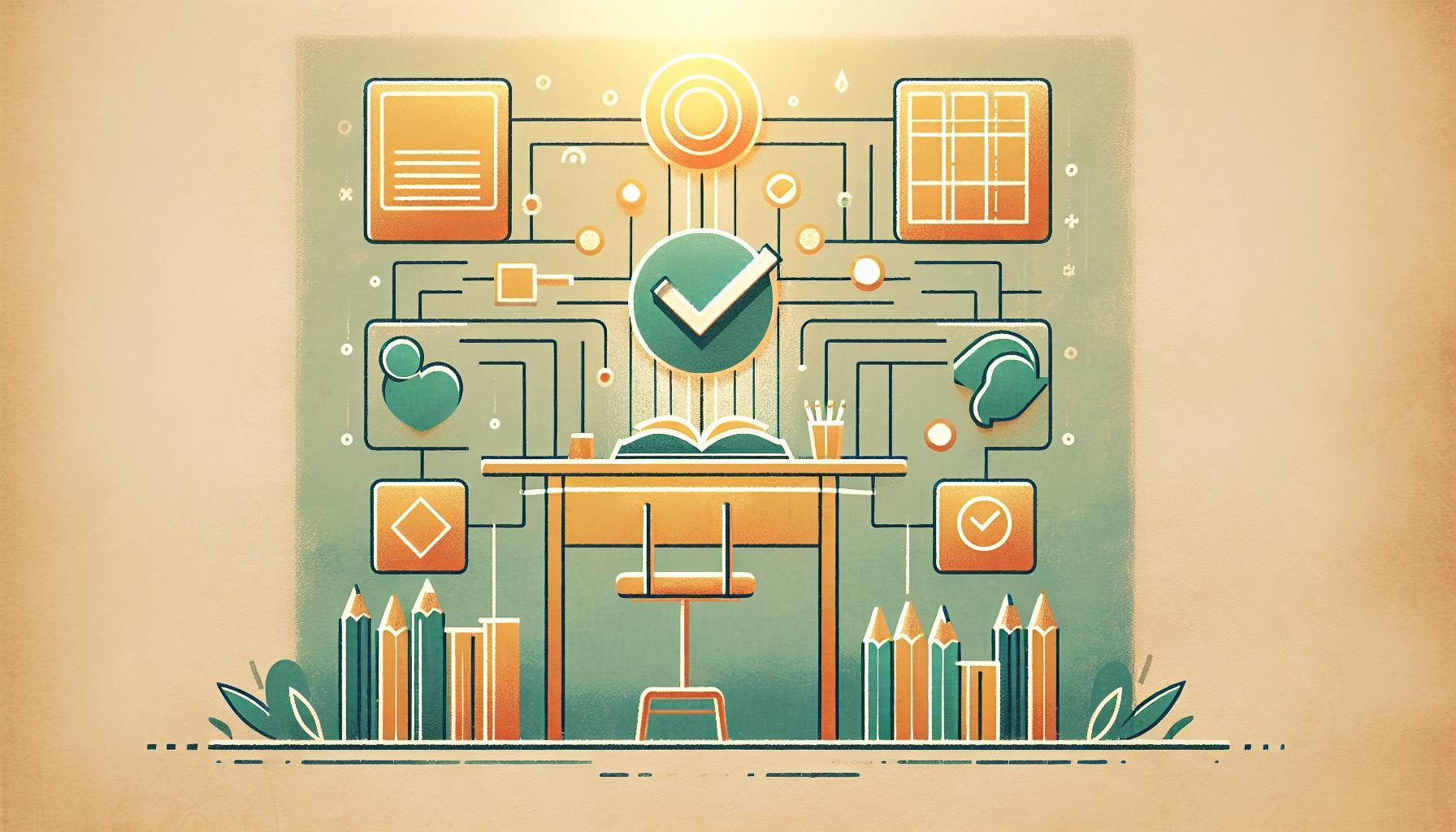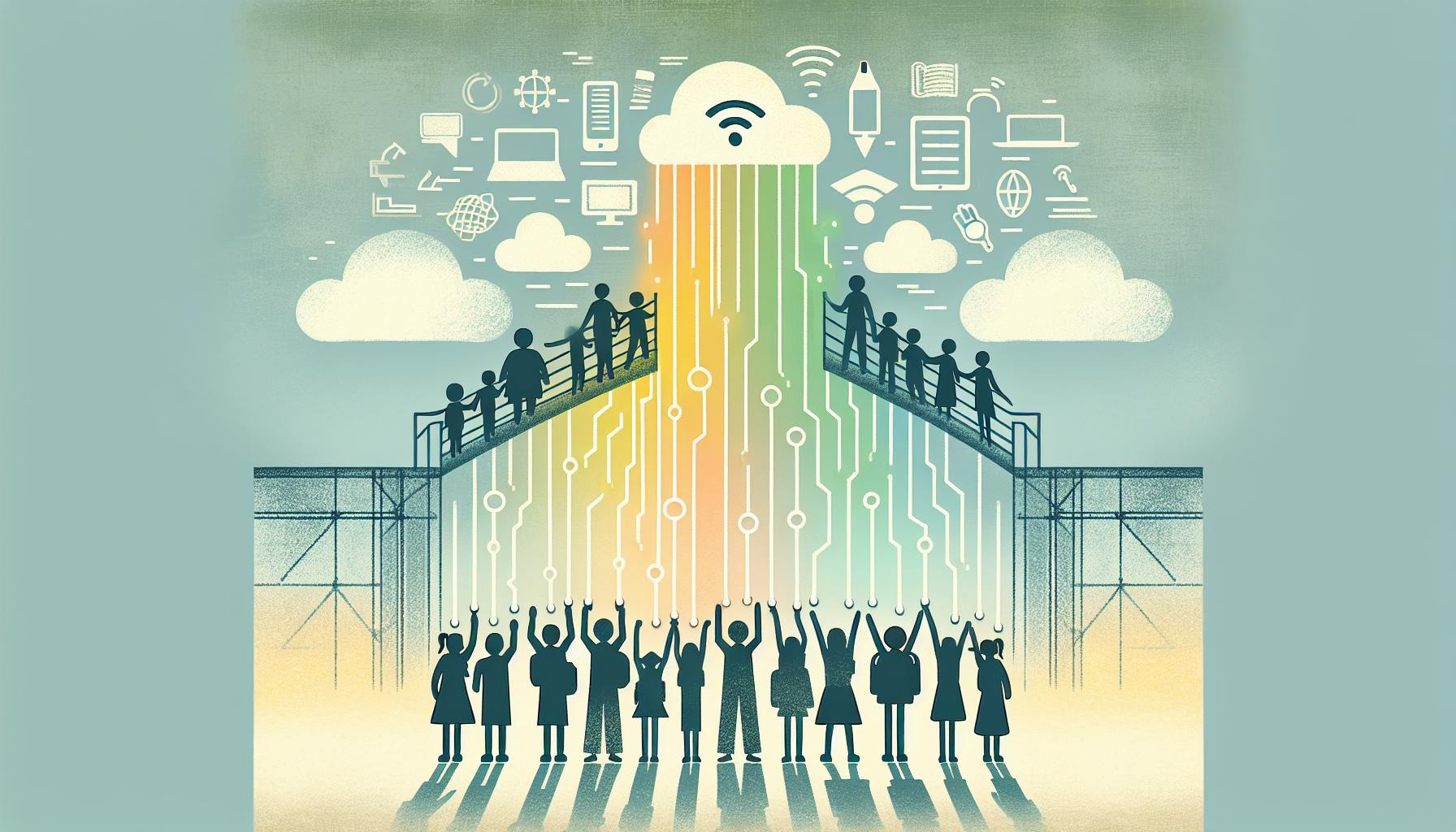Connecting with one's community through service and civic engagement is universally agreed to enrich students' education.
This article will outline the key elements of effective service learning programs that empower students, transform communities, and promote civic responsibility.
You'll learn definitions and frameworks, strategic approaches for developing curricula, how to maximize benefits for all stakeholders, and practical guidance for implementation including identifying opportunities, researching needs, facilitating student experiences, and reflecting on impact.
Exploring the Intersection of Service Learning and Civic Engagement
Service learning provides students with opportunities to develop civic responsibility and critical thinking skills through community involvement. By integrating service activities into the curriculum, students can apply academic knowledge to address real-world issues.
Understanding Service Learning: Definition and Importance
Service-learning is an educational approach that combines community service with instruction and reflection to enrich learning, teach civic responsibility, and strengthen communities. It involves students in organized service activities that address local needs while developing their academic skills and commitment to civic engagement.
For example, high school students studying environmental science may test water samples from local streams and lakes as part of a project to monitor pollution levels. Through this hands-on work, they gain a deeper understanding of ecological concepts while providing a valuable service to their community.
Service learning is important because it allows students to connect their academic coursework with real-world applications. It promotes deeper learning as students integrate new knowledge and skills to solve problems in their community. Service learning also helps develop citizenship, leadership, and other life skills.
The Role of Service Learning in Promoting Civic Responsibility
Participating in service-learning activities cultivates students' sense of civic duty and compassion. As students work to address issues in their community, they gain firsthand experience with social problems and how to create positive change.
Through guided reflection, students also analyze their service experience to gain a deeper understanding of civic responsibility. Reflecting on questions like “How has your view of the problem changed?” and “What is your responsibility to the community?”, pushes students to think more critically about the role they can play in bettering society.
By tying course learning objectives to community needs, service learning empowers students and helps shape their civic identity.
Service Learning Organizations: Partners in Educational Success
Service-learning organizations like City Year and Youth Service America help facilitate impactful programs in schools across America. By providing funding, resources and networking opportunities, these nonprofits support education institutions in implementing high-quality service-learning initiatives.
Service-learning organizations also coordinate large-scale days of action like MLK Day and Global Youth Service Day which provide meaningful service opportunities for youth across the country.
These partnerships between schools and service-learning organizations create enriching educational experiences for students, allowing them to develop leadership qualities while creating positive change.
Why is it important to engage in civic engagement and service learning?
Engaging in civic engagement and service learning provides students with invaluable real-world experiences that allow them to apply academic concepts while addressing community needs. Here are some of the key benefits:
Develops Critical Thinking and Problem Solving Skills
Through service learning projects, students must assess community problems, develop solutions, and reflect on the effectiveness of their work. This process strengthens critical thinking abilities.
Provides Meaningful Learning Opportunities
By working within their local community, students gain exposure to real issues and learn practical skills that textbooks cannot teach. This leads to more engaged and motivated learners.
Encourages Collaboration and Leadership
Service learning is rarely done alone. Working together on a shared goal teaches students collaboration, communication, and leadership abilities that will benefit them throughout life.
Promotes Civic Responsibility
Participating in service learning instills the importance of civic duty and being an active community member. Students realize their ability to create positive change.
In summary, civic engagement and service learning enables the growth of well-rounded individuals who can succeed in college, career, and life with the ability to solve problems and uplift their communities. The hands-on experiences are invaluable.
How does participating in service learning increase your civic and or community knowledge?
Participating in service learning can increase students' civic and community knowledge in several key ways:
Gaining first-hand experience
By actively participating in service projects within their local community, students are able to gain first-hand experience engaging with community issues. This gives them a deeper understanding of the needs, challenges, and operations of their community.
Developing cultural awareness
Through service learning, students are exposed to diversity within their community. Working alongside and helping those from different backgrounds facilitates cultural and racial understanding and reduces stereotypes.
Understanding social issues
Getting involved with organizations that deal with societal issues makes students more aware of these problems. Interacting with those affected gives them perspective and comprehension of the social issues their communities face.
Building citizenship skills
Service learning encourages volunteers to become active citizens who feel socially responsible to catalyze change. The experience grants them communication skills and leadership capabilities to take civic action.
Inspiring future service & engagement
By participating in service learning, students gain insight that can inform their future engagement. The exposure and experience often inspires a lifelong commitment to community service.
What is the difference between civic engagement and community service?
Civic engagement and community service are related concepts that both involve contributing positively to society. However, there are some key differences:
- Civic engagement is actively participating in the civic and political life of one's community. This includes things like voting, volunteering on political campaigns, contacting elected officials about issues, attending town halls and public meetings, etc. The goal is to influence decision-making and bring about change.
- Community service involves donating one's time and effort to help others in the community. Common examples are volunteering at a food bank, participating in neighborhood cleanups, tutoring students, etc. The focus is more on providing direct services rather than influencing policy decisions.
So in summary:
- Civic engagement aims to impact society on a broader, systemic level through political and social change.
- Community service provides helpful services directly to those in need on a more individual level.
While distinct, civic engagement and community service can work together. For example, a community service project around homelessness could inspire someone to get more involved in advocacy related to housing policy issues. And greater civic participation can inform community service efforts about real needs.
Ultimately, both civic engagement and community service play important and complementary roles in bettering society. Finding ways to engage in both can help empower citizens to create positive change.
sbb-itb-bb2be89
How do you promote civic engagement in schools?
Creating opportunities for students to apply their learning through service builds civic responsibility. Here are some ideas to foster civic engagement:
Get Students Invested in the Community
- Have students identify issues in their neighborhood that need solving. Guide them to brainstorm practical solutions.
- Organize a volunteer project where students' efforts directly benefit the community. Possibilities include cleaning up parks, helping at food banks, or making care packages for people in need.
- Partner with local nonprofits that need volunteers. Match projects to curriculum standards so students see how their service connects.
Provide Structured Reflection
- Build in time for students to reflect on what they learned from their service activities. Journaling, discussions, and presentations allow processing.
- Ask reflective questions that tie service back to course learning objectives. Help students see their growth in skills and knowledge.
- Have students set future civic goals after reflecting on their experiences. This motivates continued engagement.
Seek Community Partners
- Work with community organizations, leaders and local government agencies. These partnerships create mutually beneficial projects tailored to students' skills and community needs.
- Develop an advisory council of community partners. Meet regularly to sustain partnerships and find new project opportunities.
- Feature community partners in school events or materials. Express appreciation publicly to maintain relationships.
Simple, practical steps centered on service learning experiences equip students to become engaged citizens invested in strengthening their communities.
The Core Elements of Service Learning in Education
Service-Learning Theory: Frameworks for Effective Practice
Service-learning is grounded in theories of experiential education, civic engagement, and social justice. Key frameworks emphasize the importance of balancing service objectives with learning goals, promoting student voice and choice, and incorporating structured reflection. Effective programs apply critical thinking to community issues, develop citizenship skills, and foster an ethic of service.
When designing service-learning curricula, key principles include:
- Authentic partnerships between educators and community organizations
- Student participation in planning and problem-solving
- Real-world projects that meet genuine community needs
- Ongoing reflection that connects experience to course learning goals
Following these guidelines allows students to apply academic knowledge through projects, gain exposure to careers, and develop civic awareness.
Developing a Service Learning Curriculum: A Strategic Approach
Integrating service learning requires aligning projects with academic standards across subject areas. Strategies include:
- Assessing community assets and needs
- Identifying issues suitable for student investigation
- Developing a scope and sequence matching grade competencies
- Training teachers on implementation methods
- Establishing community partnerships
- Evaluating projects and revising based on outcomes
This process allows schools to strategically develop a progression of service activities tailored to curriculum goals.
Service Learning in High School: Preparing the Next Generation
In high school, service learning provides real-world relevance to coursework. Benefits include:
- Career exposure through community internships
- Enhanced leadership as students design projects
- College application differentiation
- Improved academic outcomes
- Development of problem-solving skills
Examples include water quality testing for environmental science, foreign language lessons for ELL students, civic engagement campaigns, or technical assistance for nonprofits. These experiences impart practical skills while activating classroom knowledge.
Critical Thinking and Skills Development Through Service Learning
Quality programs teach students to analyze community issues, recognize multiple perspectives, and develop solutions. This fosters abilities like:
- Critical thinking
- Problem-solving
- Communication and interpersonal skills
- Time management
- Personal and social responsibility
By articulating connections to academic concepts through reflection, students integrate higher-order skills that transfer across subjects.
Maximizing the Benefits of Service Learning
Benefits of Service Learning for Students and Educators
Service learning provides numerous benefits for both students and educators. For students, it enables them to apply academic concepts to real-world issues, developing critical thinking, problem-solving, and other vital skills. Through service activities, students gain exposure to diverse communities and viewpoints, building empathy and global awareness. Service learning also boosts students' civic engagement, leadership abilities, and career readiness.
For educators, incorporating service learning brings new energy and purpose to teaching. Seeing students make concrete connections between course material and community needs is deeply rewarding. Service learning also forges stronger bonds between teachers, students, and community partners. Overall, it facilitates more engaging, student-centered instruction.
Community Involvement and Positive Social Change
At its core, service learning aims to foster community involvement and catalyze positive social change. Students perform needed services for local organizations, leveraging their skills and talents to meet pressing needs. This empowers students as change agents while building community capacity. Service activities also expose students to diverse populations and environments, nurturing understanding and social cohesion.
Furthermore, service learning enables students and educators to identify root causes of social issues. Through post-service reflection, they can explore structural improvements to avoid band-aid solutions. With more informed, civically-engaged citizens entering society, communities can better advocate for systemic reforms.
Reflection as a Tool for Deeper Learning
Critical reflection represents an integral component of quality service learning. Students thoroughly examine their experiences, assumptions, and insights to achieve deeper learning. This reflection occurs before, during and after service activities through journals, papers, presentations, and class discussions.
Guiding questions help students analyze the impact of service experiences on personal growth, civic awareness, academic understanding, and commitment to future service. Reflection enables students to process complex emotions, grapple with ethical dilemmas, and extract wider lessons. It transforms service experiences into enduring sources of wisdom and personal transformation. Ultimately, structured reflection gives experience meaning and maximizes learning outcomes.
Implementing Service Learning Opportunities
Service learning provides students with the opportunity to develop critical thinking skills and civic responsibility while addressing real community needs. As an educator, you play a crucial role in facilitating impactful service learning experiences. Here is some guidance on how to create and guide service learning opportunities for your students.
Identifying and Creating Service Learning Opportunities for High School Students
- Research local nonprofits and community organizations to discover needs aligned with learning objectives
- Allow students to brainstorm and propose ideas for service projects
- Partner with local shelters, food banks, parks, schools, or conservation groups
- Tie projects to academic subjects and learning standards
The Investigation: Researching Community Needs
Before starting a service learning project, students should investigate community needs by:
- Surveying community members to identify issues
- Researching statistics on local challenges
- Interviewing staff at nonprofits or civic organizations
- Attending community board meetings
This investigation allows students to align projects to meaningful real-world problems.
The Teacher's Role in Facilitating Service Learning
As a teacher, you should:
- Provide guidance on project planning and organization
- Arrange partnerships with local organizations
- Supervise student reflection activities
- Assess projects based on learning objectives
- Motivate students to think critically about social issues
Your involvement is key to maximizing the academic and civic value.
A Day of Action: Service Learning in Practice
A "Day of Action" dedicates class time for students to implement service projects. For example, students could:
- Volunteer at a food bank, preparing and distributing meals
- Lead educational activities at an elementary school
- Plant trees or remove invasive species at a local park
- Set up a donation drive for supplies needed by a women's shelter
The hands-on experience allows students to directly engage with community needs and develop real-world skills. Reflection activities afterwards connect the project to course learning objectives.
Conclusion: Reflecting on the Impact of Service Learning
Service learning provides students with invaluable opportunities to apply their knowledge and skills to address real-world problems in their communities. As summarized in this article, some of the key benefits of incorporating service learning into education include:
- Developing critical thinking, problem-solving, and leadership abilities
- Cultivating empathy, civic responsibility, and an appreciation for diversity
- Gaining hands-on experience and making connections between academics and real-world issues
- Building communication, teamwork, and professional skills
Additionally, research shows that participation in service learning boosts students' academic achievement, school engagement, and desire to actively contribute to society.
By engaging students in community service projects, educators empower the next generation to be conscientious citizens who can think critically about complex challenges. Service learning facilitates meaningful growth experiences that impart essential skills and shape students' worldviews.
Though organizing service learning opportunities requires commitment from schools and teachers, the profound impact on students makes the effort worthwhile. As education strives to develop engaged citizens who uplift their communities, service learning will continue to be a transformational pedagogy that brings academic content to life.


